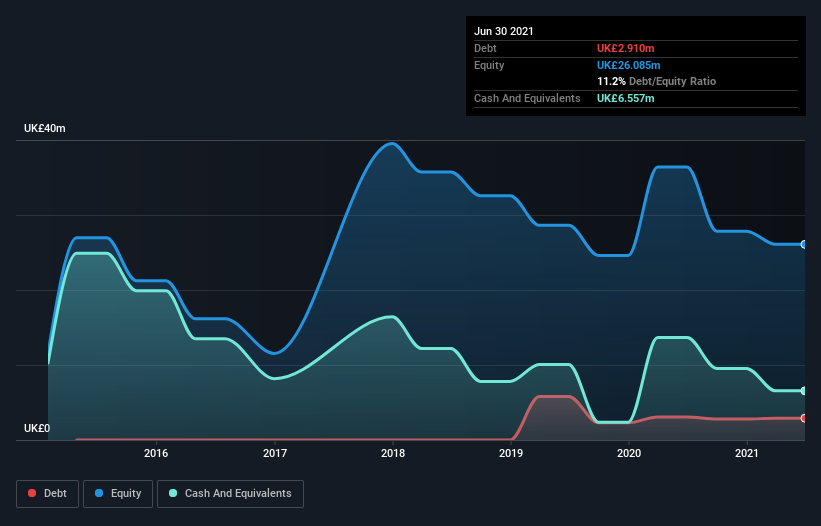Tissue Regenix Group (LON:TRX) Has Debt But No Earnings; Should You Worry?
- Oops!Something went wrong.Please try again later.
Some say volatility, rather than debt, is the best way to think about risk as an investor, but Warren Buffett famously said that 'Volatility is far from synonymous with risk.' It's only natural to consider a company's balance sheet when you examine how risky it is, since debt is often involved when a business collapses. Importantly, Tissue Regenix Group plc (LON:TRX) does carry debt. But is this debt a concern to shareholders?
When Is Debt A Problem?
Generally speaking, debt only becomes a real problem when a company can't easily pay it off, either by raising capital or with its own cash flow. Part and parcel of capitalism is the process of 'creative destruction' where failed businesses are mercilessly liquidated by their bankers. However, a more usual (but still expensive) situation is where a company must dilute shareholders at a cheap share price simply to get debt under control. Of course, the upside of debt is that it often represents cheap capital, especially when it replaces dilution in a company with the ability to reinvest at high rates of return. When we think about a company's use of debt, we first look at cash and debt together.
See our latest analysis for Tissue Regenix Group
How Much Debt Does Tissue Regenix Group Carry?
As you can see below, Tissue Regenix Group had UK£2.91m of debt at June 2021, down from UK£3.07m a year prior. But on the other hand it also has UK£6.56m in cash, leading to a UK£3.65m net cash position.
How Healthy Is Tissue Regenix Group's Balance Sheet?
Zooming in on the latest balance sheet data, we can see that Tissue Regenix Group had liabilities of UK£2.60m due within 12 months and liabilities of UK£5.63m due beyond that. Offsetting these obligations, it had cash of UK£6.56m as well as receivables valued at UK£2.92m due within 12 months. So it actually has UK£1.26m more liquid assets than total liabilities.
This short term liquidity is a sign that Tissue Regenix Group could probably pay off its debt with ease, as its balance sheet is far from stretched. Succinctly put, Tissue Regenix Group boasts net cash, so it's fair to say it does not have a heavy debt load! When analysing debt levels, the balance sheet is the obvious place to start. But ultimately the future profitability of the business will decide if Tissue Regenix Group can strengthen its balance sheet over time. So if you want to see what the professionals think, you might find this free report on analyst profit forecasts to be interesting.
In the last year Tissue Regenix Group wasn't profitable at an EBIT level, but managed to grow its revenue by 3.8%, to UK£14m. We usually like to see faster growth from unprofitable companies, but each to their own.
So How Risky Is Tissue Regenix Group?
Statistically speaking companies that lose money are riskier than those that make money. And in the last year Tissue Regenix Group had an earnings before interest and tax (EBIT) loss, truth be told. Indeed, in that time it burnt through UK£6.3m of cash and made a loss of UK£9.0m. Given it only has net cash of UK£3.65m, the company may need to raise more capital if it doesn't reach break-even soon. Overall, its balance sheet doesn't seem overly risky, at the moment, but we're always cautious until we see the positive free cash flow. The balance sheet is clearly the area to focus on when you are analysing debt. However, not all investment risk resides within the balance sheet - far from it. For instance, we've identified 2 warning signs for Tissue Regenix Group that you should be aware of.
When all is said and done, sometimes its easier to focus on companies that don't even need debt. Readers can access a list of growth stocks with zero net debt 100% free, right now.
This article by Simply Wall St is general in nature. We provide commentary based on historical data and analyst forecasts only using an unbiased methodology and our articles are not intended to be financial advice. It does not constitute a recommendation to buy or sell any stock, and does not take account of your objectives, or your financial situation. We aim to bring you long-term focused analysis driven by fundamental data. Note that our analysis may not factor in the latest price-sensitive company announcements or qualitative material. Simply Wall St has no position in any stocks mentioned.
Have feedback on this article? Concerned about the content? Get in touch with us directly. Alternatively, email editorial-team (at) simplywallst.com.


